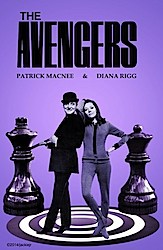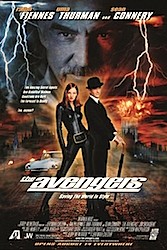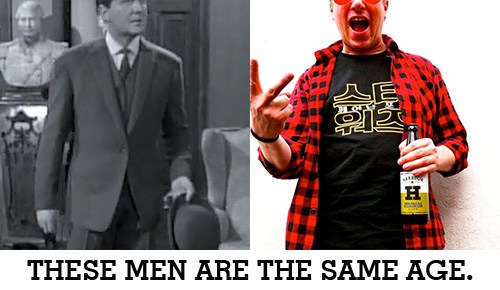
The A-word.
It's the bane of cinephiles, everywhere.
That book you love; the comic you remember; the show you used to watch; the game you lost an entire summer playing? Oh, someone's adapted it and it's getting made into a movie! Whether a cause for pre-emptive celebration or foreboding caution, it leads to only one thing: expectation. And expectation is the death of the 'clean' movie-viewing experience; no matter how closely the film sticks to its source material, or how much it tries to distance itself, it will be faced with the hurdle of comparison.
And while the movie industry loves the pre-built marketing buzz of 'now a major motion picture!', they loathe the comparative references which will be made from the first review onwards. Because many punters will expect to get exactly the same reaction from a completely different medium, to a story they already know. And therein lies the problem.
In this monthly series, we'll look back at some of the most respected and best-loved properties which have made the perilous journey to the big screen; often with some controversy, and almost always with far too much hype. This isn't so much a review of the films themselves, more an appraisal of their suitability as an adaptation.

 The Avengers
The Avengers
Thames Television (1961-1969)
And so, Adaptation-season jumps through the smaller screen for its televisual-phase, beginning with the 1960s. An expertly crafted mix of espionage, action and wry humour, ITV's The Avengers*1 was a mainstay on British TV screens throughout the decade. The show quickly elevated its supporting star Patrick Macnee to leading-man status as John Steed, then paired him up with a succession of more-than-capable female counterparts. Of the 161 episodes made, only 139 are known to survive intact to this day. Even so I'm not made of time, so I took in a sampling from the Emma Peel (Diana Rigg) era of the show, watching nine episodes from 1965, '66 and '67 (series 4 and 5)*2.
The first thing that strikes you is how effortlessly charming the series is, despite being inescapably cheesy. When Steed and Peel aren't discussing plot-based matters, they're zinging off each other with almost every line, their flourishes and quips working in tandem rather than competition. Both Macnee and Rigg carry this off perfectly. What's particularly nice for a 'vintage' show is that Emma Peel's character is treated as an equal (narratively at least), rather than an ornamental sidekick who's there for the dads. That said, there does seem to be a concerted effort to have her in a form-fitting black leather jumpsuit by the time of the inevitable melee at each episode's climax. And while there's the occasional mild flirting going on between the leads, there's never any suggestion that it's anything other than verbal sparring, which is kind of sweetly refreshing.
That said, these episodes were never made to be viewed back to back, and in the age of binge-watching the show's structural mainstays and callbacks quickly begin to look… formulaic. From each installment's prelude showing some nefarious force at large, to Steed calling round at Peel's house to brief her on the case, to the bit where they split up and arrive at the villain's lair separately pretending not to know each other like an episode of Hustle, all the way through to the impactless gunshots, shonky fight-choreography, and a coda of the pair driving calmly victorious down the road; you get the feeling each script more or less wrote itself, bar the initial setting and the antagonists' character names.
Once we get into series 5 the presentation moves from black and white into colour (a big deal at the time, I assure you youngsters). With it, the production budget seems to have been raised, too. There are far more exterior location scenes (these were used largely as establishing shots in the earlier episodes), and Emma Peel's wardrobe goes from suave sophistication to full on swinging sixties (which helps accentuate the shows's colour, to be fair). But something seems to have been lost in the transition, with the more formal feel of the monochrome days behind it. By this point, the James Bond series was four movies into its stride and providing stiff competition in mixing spies, stunts and satire. While the Avengers episodes I watched from series 5 were still entertaining enough, there's the feeling that the writers were starting to feel constrained by hour-long, standalone stories. The programme was far from over of course, and went on for another thirty-three entries for its sixth and final series, before being rebooted as The New Avengers in 1976 (which lasted for a comparably short twenty-six episodes over two series).
All in all though, The Avengers is great, stylish fun, and proof that if the premise is strong and your leading characters have enough personality, the rest of the show will fall into place around them. It makes absolute sense that a big-screen adaptation would be on the cards at some point. I imagine this is why the film was commissioned, at least.
One thing which isn't addressed in the episodes I watched though, is who are the Avengers working for? Although we see a couple of his informants, Steed isn't shown having any contact with superiors or managing organisation. Who's alerting them to these injustices that they find with alarming regularity? Who are they accountable to if they mess up or even fail completely? Week in week out, people are dying here, and there doesn't seem to be any sort of handover or cleanup operation. Again, I suppose it's refreshing in the 21st century to watch a spy franchise which isn't bogged down with procedural bureaucracy, but still. Apart from anything else, who's bankrolling Emma Peel's wardrobe? She wears a lot of white in the early episodes, and that blood isn't going to come out, mark my words…
My favourite line comes from 1967's A Funny Thing Happened On The Way To The Station. Steed is having a face-off with the evil genius he's unmasked as being behind a mysterious series of deaths on a train line running into King's Cross:
Villain: You see, I am going to blow up your Prime Minister!
Steed: Oh… how do you know which way I voted?
Patrick Macnee. Relevant as ever.

 The Avengers
The Avengers
Jeremiah S. Chechik (1998)
I saw this film upon its cinematic release at Dreamland Cinema, Margate. I have vague memories of vaguely enjoying it, although not to the point of a) renting or buying the domestic-release or b) actually seeing it again, at all. I certainly didn't pan it to the point of most critics, otherwise it wouldn't have been chosen for Adaptation. Of course, I watched films differently in 1998. So a revisit after nineteen years should prove interesting...
Yeah, it's not great is it? Alarm bells start to ring when you notice the run-time is only 86 minutes, which isn't usually a great sign with live-action movies. And if writer Don MacPherson*3 and director Jeremiah Chechik are scaling up 50-minute TV episodes but can't break the hour-and-a-half mark? Well, it does not set the mind at ease for the journey to come...
And what a meandering and turbulent ride that is. The very dictionary-definition of British™, Ralph Fiennes dons the mantle of Steed, while his opposite number Mrs Peel is portrayed by Uma Thurman, who was at that time hot off the back of Pulp Fiction, Gattaca and Batman & Robin. Well, quite. Sean Connery and Jim Broadbent have been employed to play themselves (as per), and there's a bit of textbook stunt-casting in the form of Eddie Izzard and Shaun Ryder as evil henchmen. Well. Quite.
So what went wrong? The core idea of the film, that a crazed scientist is holding world leaders to ransom with engineered lethal weather patterns, is perfectly apt for the Avengers. The series was never about hard espionage, but the movie version borrows as much from the feel of 1996's Mission: Impossible as it does the James Bond pantheon. We're at least introduced more properly to Steed's employer this time, in the form of 'The Ministry', and it's interesting how much foreshadowing of Kingsman this entails*4. But the problem here is in the execution, not the concept...
No matter the genre or method of delivery, some titles feature the cast emoting, interacting and… well, acting, whereas others just feel like the performers are standing in a room waiting to deliver each line. The Avengers is the second one. A leaden script weighs down proceedings all round, but never moreso than the leading pair; Steed and Peel quip and snipe as usual but there's an uncharacteristic level of actual flirting here, while Fiennes and Thurman paradoxically share absolutely no screen-chemistry. They're also not entirely suitable for the parts they're playing. Thurman manages the British™ accent well enough, but that's about it. Fiennes meanwhile is far too posh for this role. Patrick Macnee's Steed (the actual definitive version, remember) was well-spoken and unfailingly polite, but not 'posh'. This means when it comes to getting his hands dirty, the 1998 iteration of the hero carries a look of disgust, rather than determination.
Dragging along the other end, Connery is neither good nor bad, of course; he is just Connery; an act which either works for a film or does not. Funnily enough, this outing makes an interesting viewing companion to his appearance in last month's League of Extraordinary Gentlemen. I think the fundamental problem is setting this film in 'the present day'. Had it been a period-piece in the 1960s (a la Man From U.N.C.L.E.), it might have retained some of its innate charm. Unlike Bond and M:I, the primary-phase Avengers didn't try to move beyond their era, they embraced it and bowed out gracefully. As opposed to being booed off the stage.
I'm very aware that my pre-amble at the top states that this wouldn't be a review of the film, but its suitability as an adaptation. Unfortunately, the manifold problems with 1998's Avengers are precisely why it fails to carry on the legacy of Macnee and RIgg. Had this been an unbranded spy-caper it would have disappeared without trace, and certainly without the malice it attracted (or earned, depending on your point-of-view).
Misguided, certainly, but quite not a total failure, the oversize teddy bear costumes and CGI hornets of The Avengers aren't even the most painful part. Bad writing and terrible casting conspire to hobble what could (should) have been a fun, disposable cinematic romp. A lesson for us all, Chechik's film at least serves as evidence that Steed and Peel belong on the small screen...

Hell, yeah.

Hell, no.

The early one as a televisual history lesson; the latter out of morbid curiosity.

Not in the TV episodes I watched, and I didn't hear one in the film.

Level 1: The TV series featured, across its considerable run, appearances from Christopher 'Dooku' Lee, Peter 'Tarkin' Cushing, Julian 'Veers' Glover, Caroline 'Mothma' Blakiston, Brian 'Nass' Blessed, Michael 'Needa' Culver, Bruce 'Rieekan' Boa, Drewe 'Red Leader' Henley and Peter 'All Of The Stunts Throughout The OT' Diamond.
The movie version features Christopher 'voice-work on Battlefront and The Old Republic' Godwin. Outside of the iconic Laurie Johnson TV theme, scoring duties are handled by Joel 'Shadows of the Empire' McNeely. Not quite as impressive but you do what you can, I suppose.
*1 Arriving on our TV screens on 1961, the show pre-dated Marvel's famous comic-title by two years. And even though the ill-fated 1998 film had been subconsciously blanked-out by most movie-goers for over a decade, when it came to the 2012 MCU teamup, the decision was made to amend the UK title to 'Avengers Assemble' to avoid confusion between the two properties. No, seriously. After all, you wouldn't want a punter looking at a poster of Captain America, Iron Man and The Hulk while saying to their partner "let's not bother with this Avengers film, it's obviously a continuation of that misguided Ralph Fiennes outing from the last century and clearly nothing to do with the concentrated marketing blitz of Marvel/Paramount that's being going on for four years now…" [ BACK ]
*2 If you want an indication of how society in general has changed, the show's leading actor Patrick Macnee was born in 1922. So at the time of the 1966 episode of The Avengers, The Danger Makers, he was forty-four years old. While he's obviously dressed 'in character' for his part, the man is nonetheless perfectly suited to his level of sartorial maturity and accompanying deportment. I only mention this because while I was admiring his suits during watching, it really hit home that there was a comparison to be made. See if you can guess which one of these is me…

I am minded once more of the words of vampire and raconteur, Louis de Pointe du Lac:
"But times were different then. I was a man at your age…" [ BACK ]
*3 And sorry to go leaping in here right off the bat, but for the script's inclusion, mangling and butchering of a Blade Runner "time to die" reference, it can fuck right off. [ BACK ]
*4 Bizarrely, there's also an unintentional foreshadowing of 1999's Austin Powers: The Spy Who Shagged Me, with a road-chase between Steed/Peel and a horde of giant mechanical hornets. The pursuit takes place on narrow, unmarked country roads - typical of the famous British countryside. But there are also intercut shots clearly produced in post-production pickup filming, with different colour-timing, where the road is twice as wide as the UK standard, and is divided by a central, unbroken white-line.
I am minded once more of the words of Mr Austin Danger Powers:
"You know what's remarkable? How much England looks in no way like Southern California...." [ BACK ]
DISCLAIMERS:
• ^^^ That's dry, British humour, and most likely sarcasm or facetiousness.
• Yen's blog contains harsh language and even harsher notions of propriety. Reader discretion is advised.
• This is a personal blog. The views and opinions expressed here represent my own thoughts (at the time of writing) and not those of the people, institutions or organisations that I may or may not be related with unless stated explicitly.

The programme did start off more as hard espionage, and the episodes with Venus Smith or Cathy Gale rather than Emma Peel were much straighter spy stuff. It only got really bonkers once the Steed/Peel ones went into colour. (That's also when Peel swapped her leather for crimplene; I'm always baffled at the association of Emma Peel with leather trousers as that was *absolutely* Cathy Gale's thing, whereas Peel spent more of her time in zip-fronted technicolor polyester. I guess some things just stick in the popular imagination as How Things Should Have Been.) Aaaaah, I love The Avengers. It's up there with The Prisoner and Quatermass on my list of fave TV programmes. (!970s you say? Never going to happen...)
ReplyDeleteI loved The Prisoner when it had a brief resurgence of popularity in the early 90s. A bit too scared to go back and watch it again because I know there was a lot of 'filler' there...
Delete